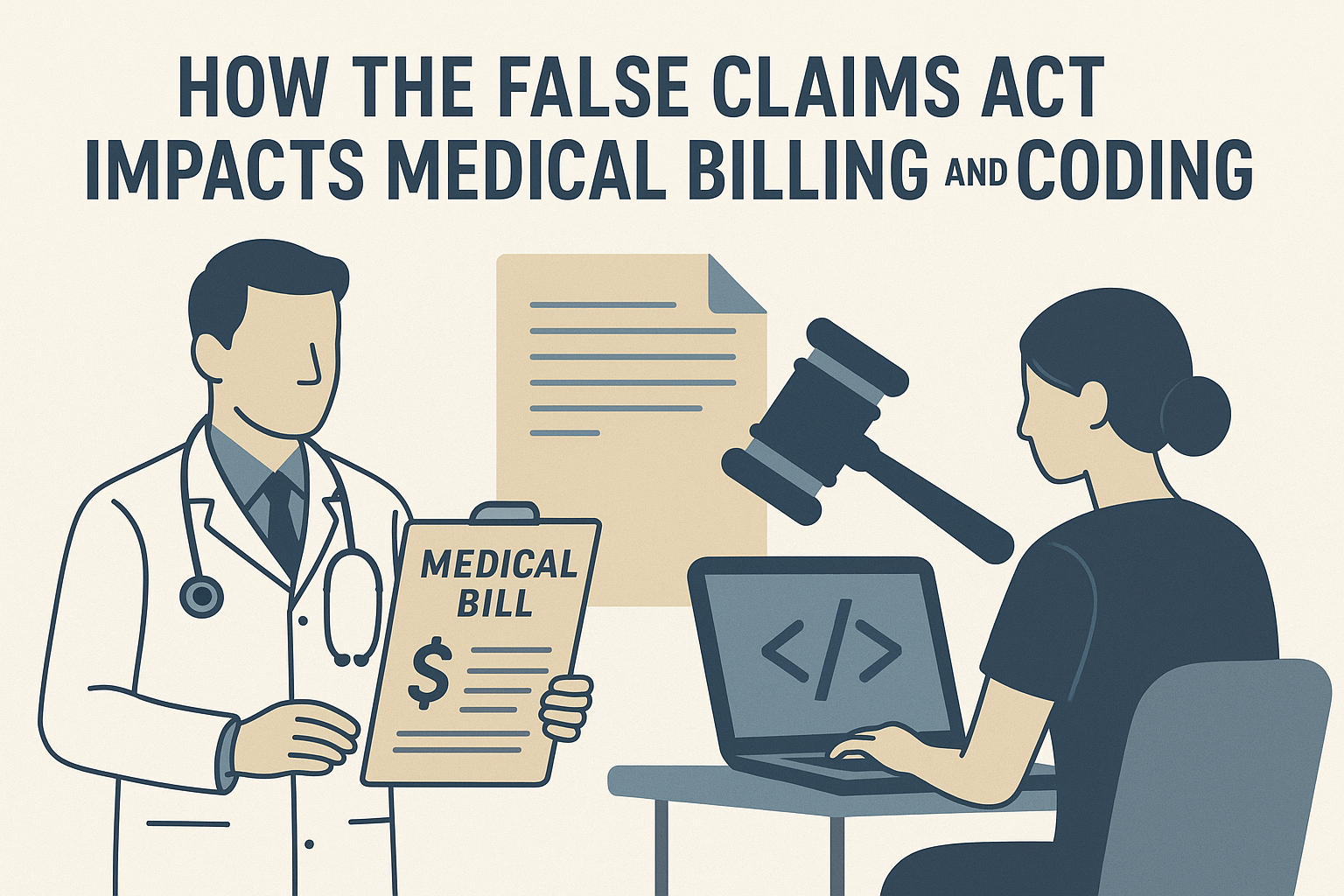Billing and coding are at the heart of revenue cycle management in healthcare. Every submitted claim must accurately reflect the service provided, the associated diagnosis, and compliance with payer guidelines. Errors, whether intentional or accidental, can trigger FCA violations.
Here’s how the FCA affects medical billing and coding operations:
-
Upcoding and Overbilling
Upcoding occurs when a healthcare provider bills for a higher-level service than what was actually provided, aiming for higher reimbursement. Under the FCA, knowingly submitting these claims constitutes fraud and can result in treble damages and civil penalties. -
Unbundling Services
Unbundling refers to billing services separately that should be billed together under a single code. This practice inflates reimbursement and can lead to FCA violations if done knowingly. -
Billing for Services Not Rendered
Any claim submitted for services that were not actually provided is considered fraudulent. The FCA enforces penalties for these false claims, emphasizing the importance of accurate documentation. -
Inadequate Documentation
If claims lack sufficient supporting documentation or medical records, the risk of FCA violations increases. Documentation must clearly justify medical necessity and match the submitted CPT/HCPCS codes. -
Billing by Excluded Providers
Claims submitted for services rendered by providers excluded from federal healthcare programs, or those lacking proper licensure, can lead to FCA penalties.
By understanding these areas of risk, billing and coding teams can take proactive measures to prevent violations and avoid costly legal actions.
Common Scenarios Where the FCA Applies
FCA enforcement in healthcare is typically triggered in the following situations:
-
High-risk billing practices: Consistently billing more complex procedures than performed or unbundling services to maximize reimbursement.
-
Documentation discrepancies: Claims that are inconsistent with patient records or fail to substantiate medical necessity.
-
Duplicate or fraudulent claims: Submitting the same claim multiple times or including services that were not provided.
-
Non-compliance with federal program rules: Failing to follow Medicare or Medicaid guidelines, including timely filing requirements, can lead to FCA scrutiny.
It is worth noting that even unintentional mistakes can sometimes trigger FCA investigations if the error demonstrates reckless disregard for compliance standards.
The Financial and Operational Impact of FCA Violations
Healthcare organizations face serious consequences if found in violation of the FCA:
-
Financial Penalties
Violations can result in treble damages, civil penalties per claim, and substantial legal costs. These financial consequences can be devastating for smaller practices or clinics. -
Reputational Damage
FCA violations often lead to negative publicity, loss of trust among patients and payers, and potential exclusion from federal programs. -
Operational Disruptions
Investigations and audits consume significant staff time and resources, diverting attention from patient care and revenue cycle operations. -
Increased Compliance Requirements
After an FCA violation, organizations may be subject to heightened oversight, stricter reporting requirements, and more frequent audits, increasing operational burden.
Because of these risks, proactive compliance and vigilance in billing and coding processes are essential for every healthcare organization.
Best Practices for Compliance in Medical Billing and Coding
Healthcare providers can adopt several strategies to mitigate FCA risks while improving billing efficiency:
1. Accurate Coding and Documentation
-
Ensure every service is supported by appropriate CPT/HCPCS and ICD-10 codes.
-
Maintain thorough, accurate documentation in patient records to substantiate claims.
2. Regular Internal Audits
-
Conduct routine audits of billing practices to detect anomalies or patterns of overbilling.
-
Identify high-risk areas such as high-cost procedures or frequent modifier usage.
3. Staff Training and Education
-
Provide ongoing training for billing and coding staff on regulatory updates, payer requirements, and proper coding practices.
-
Ensure that staff are aware of the FCA and understand the importance of accurate claim submission.
4. Use Technology and Automation
-
Implement claim scrubbing software to detect coding errors, missing authorizations, and inconsistencies before submission.
-
Automated systems can flag potential risks that could lead to FCA violations.
5. Partner with Experienced Revenue Cycle Management Companies
-
Outsourcing to professional billing companies reduces the risk of errors and provides expert oversight.
-
For example, partnering with Medical Billing allows organizations to streamline billing workflows, stay audit-ready, and reduce FCA exposure. Their expertise ensures proper documentation, claim accuracy, and adherence to federal compliance standards.
False Claims Act and Medicaid Audits
One common area where FCA enforcement intersects with medical billing is Medicaid audits. Medicaid is a federal-state program with strict billing guidelines, and errors or fraudulent practices can trigger investigations under the FCA. Key triggers for Medicaid audits include:
-
Repeated submission of high-cost claims
-
Unusual billing patterns compared to peer groups
-
Discrepancies between documentation and billed services
-
High volume of denied claims or excessive appeals
By understanding these triggers and implementing robust compliance practices, healthcare providers can significantly reduce the risk of FCA violations and audits.
Technology and Analytics in FCA Compliance
Modern healthcare organizations are increasingly leveraging technology and data analytics to prevent FCA violations. Advanced billing software, claim scrubbing tools, and AI-based coding systems can automatically detect inconsistencies, flag unusual coding patterns, and ensure that all claims meet payer-specific requirements before submission. By integrating these tools into the revenue cycle, organizations can reduce human error, maintain proper documentation, and demonstrate a strong compliance framework during audits.
The Role of Compliance Programs
A strong compliance program is essential to prevent FCA violations. Effective programs include:
-
Policies and procedures for claim submission, coding, documentation, and refunds of overpayments.
-
Internal monitoring through denial analysis, trend tracking, and anomaly detection.
-
Education and training for all staff involved in billing and coding.
-
Whistleblower mechanisms to allow anonymous reporting of suspected misconduct.
-
Partnership with expert RCM firms, which can provide additional oversight and risk mitigation.
When implemented effectively, these programs help organizations identify potential FCA risks before they escalate into legal or financial consequences.
Conclusion
The False Claims Act is a critical law that ensures healthcare providers submit accurate and truthful claims to federal programs. Violations can lead to treble damages, civil penalties, audits, and long-lasting reputational harm. For medical billing and coding teams, understanding FCA implications is not just a regulatory requirement — it is a cornerstone of responsible revenue cycle management.
By implementing accurate coding practices, maintaining thorough documentation, conducting internal audits, training staff, and partnering with experienced billing and revenue cycle management experts, healthcare organizations can significantly reduce risk, optimize reimbursement, and maintain compliance with federal regulations.
In an increasingly regulated environment, proactive compliance and vigilance in billing and coding are the best strategies to safeguard your practice, protect federal funds, and maintain trust with patients and payers.




Leave a Reply